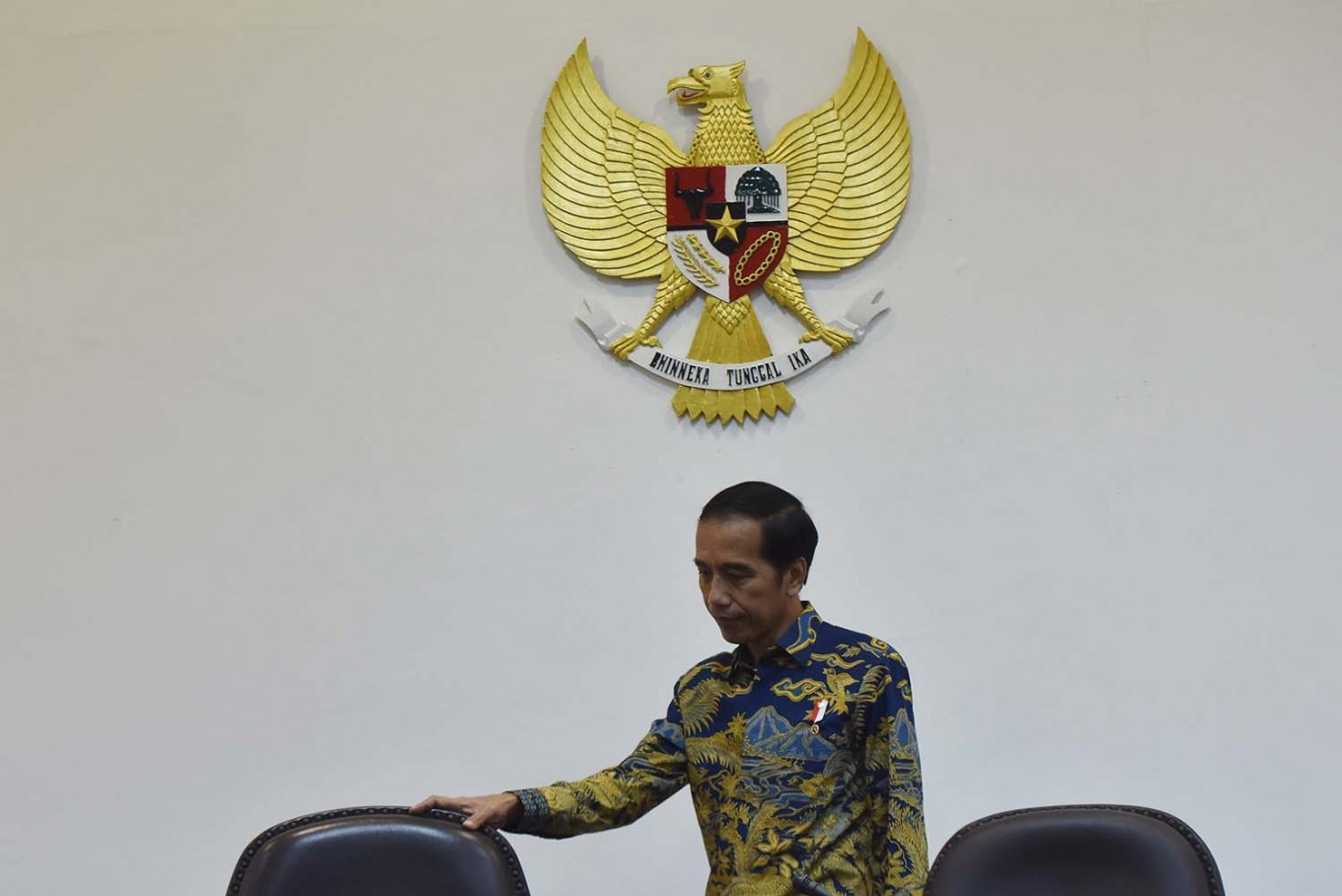Popular Reads
Top Results
Can't find what you're looking for?
View all search resultsPopular Reads
Top Results
Can't find what you're looking for?
View all search resultsJokowi warns Freeport
Change text size
Gift Premium Articles
to Anyone
A
s tension between the government and United States-based mining giant Freeport-McMoRan (FCX) continues, President Joko “Jokowi” Widodo has made his first comment on the matter, indicating that he would take firm action if necessary.
Freeport, Indonesia’s oldest foreign investor, has been in a deadlock over its future operations in Indonesia, as the government requires the company’s local subsidiary PT Freeport Indonesia to convert a contract of work (CoW) signed in 1991 into a special mining license (IUPK) in return for an export permit extension.
Freeport Indonesia has repeatedly rejected the idea of contract conversion and stated that if the dispute was prolonged, it may take the case to international arbitration, a move that many deem would be costly for both parties.
“We want to reach a win-win solution, because this is a business matter,” Jokowi said on Thursday. “Now, I will leave this matter to the ministers. However, if [Freeport management] are really difficult to deal with, I will take action.”
On Feb. 17, Freeport Indonesia sent a notification letter to the Energy and Mineral Resources Ministry describing areas of dispute between the two parties.
The issues included the obligation for miners to divest a 51-percent stake within a decade of production, the government’s role in determining base selling prices for minerals, and the contract conversion requirement, all ruled under the new Government Regulation No. 1/2017.
Freeport Indonesia has stated it would be possible to commence international arbitration if no settlement was reached within 120 days of it sending the letter.
Article 21 of Freeport’s CoW states that the government and Freeport Indonesia can settle disputes by arbitration in accordance with the 1976 Arbitration Rules of the United Nations Commission on International Trade Law (UNCITRAL) if they cannot reach an amicable settlement within 120 days.
“One of the advantages of using arbitration over litigation is that the process is quicker, as a binding ruling can be determined within around three to six months. Nonetheless, the greater the complexity of the case, the longer it takes to conclude,” Hanafiah Ponggawa and Partners managing partner Constant Marino Ponggawa said.
He explained that the appointment of a presiding arbitrator could take months, as the arbitrators of both the petitioner and the defendant were often involved in a debate over the ideal person to act as presiding arbitrator. According to Marino, fees for an arbitrator could reach millions of US dollars, depending on the reputation of the appointed person.
He said the arbitral tribunal would typically choose a neutral country to host the hearings.
“Then, whatever the decision made by the end of the arbitration process, it has to be followed by the losing side,” Marino said. “Moreover, UNCITRAL is the legal body of the United Nations system. Hence, it can make international lobbies to ensure the compliance of its ruling.”
(Read also: Jokowi threatens to take action if Freeport are 'difficult')
Earlier this week, Freeport chief executive Richard Adkerson said the company expected to find a win-win solution during the dispute settlement period as the Grasberg mine was too important for either party to neglect.
“It’s an important asset for the company. It’s an important, vital, natural resource for the Republic of Indonesia. […] But we have to find a way to work together, and Freeport is committed to trying to do that,” he said.
Under the CoW, Freeport Indonesia was initially required to sell 51 percent of its stake to Indonesian entities by 2011, or 45 percent if it had sold a minimum of 20 percent in the local stock market. Freeport owns 90.64 percent of Freeport Indonesia, while 9.36 percent is owned by the Indonesian government.
In response to the case, Finance Minister Sri Mulyani Indrawati said the government was undertaking “transitional negotiations” to tweak the management of the mining industry for the sake of investment and national interests, such as job creation, exports and state revenues.
“There will not be private, murky negotiations any longer. We just want to abide by the law and try to be better in explaining this situation to the investors.”
Since commencing operations more than five decades ago, Freeport is synonymous domestically with gold, not copper, and is usually perceived with suspicions. All affairs related to the company have always been political, with many Indonesian politicians and activists referring to it as a symbol of US economic imperialism in Indonesia.









